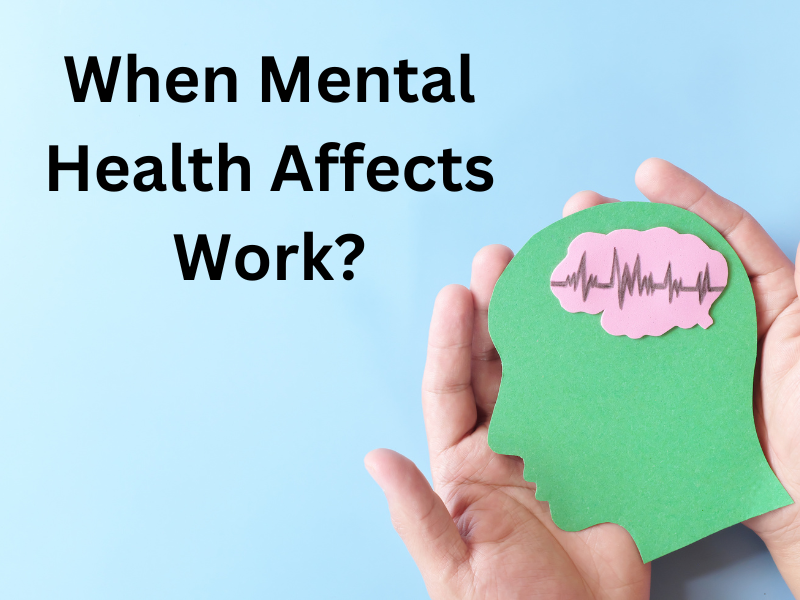
Introduction
In the fast-paced and demanding world we live in, it’s no wonder that mental health issues can have a significant impact on our work lives. The stress, anxiety, and depression that often accompany these challenges can hinder our productivity, creativity, and overall job satisfaction. Recognizing and addressing the issues that arise when mental health affects work is crucial for both employers and employees alike. In this comprehensive article, we will delve into the various ways mental health can impact work performance and provide effective strategies for managing these challenges. Whether you’re facing these issues personally or you’re an employer looking to support your team, this article will offer valuable insights, practical solutions, and resources to thrive in the face of adversity.

1. Understanding Mental Health in the Workplace
Mental health challenges can affect individuals in various ways, and the workplace is no exception. It’s crucial to have a clear understanding of these challenges to offer appropriate support and resources. By acknowledging the prevalence of mental health issues in the workplace, we can create a more empathetic and inclusive work environment.

1.1. The Prevalence of Mental Health Challenges at Work
Mental health challenges are far more widespread than most people realize. According to the World Health Organization, approximately 1 in 4 people will experience a mental health issue at some point in their lives. In a work setting, this translates to a significant number of individuals facing mental health challenges. Whether it’s stress, anxiety, depression, or other disorders, it’s essential to recognize the widespread impact of these issues.
2. Signs and Symptoms of Mental Health Issues
Identifying the signs and symptoms of mental health issues is crucial for early intervention and support. By understanding the common indicators, both employers and employees can take appropriate action to address these challenges proactively.

2.1. Common Mental Health Disorders at Work
Various mental health disorders can affect individuals in the workplace. These may include anxiety disorders, major depressive disorder, bipolar disorder, post-traumatic stress disorder (PTSD), and others. Each disorder presents unique symptoms and challenges that can impact work performance and overall well-being.
2.2. Recognizing Signs and Symptoms of Mental Health Issues
It’s essential to recognize the signs and symptoms of mental health issues to provide support and resources when needed. These may include changes in mood, excessive worry or fear, difficulty concentrating, changes in sleep patterns, decreased energy levels, and social withdrawal. Being vigilant and observant can help identify these signs and offer assistance promptly.
3. Impact of Mental Health Challenges on Work Performance
When mental health affects work, there are various ways in which it can impact job performance. Understanding these impacts allows for targeted strategies to alleviate the challenges and improve overall work productivity and satisfaction.
3.1. Decreased Productivity and Efficiency
One of the most significant impacts of mental health challenges in the workplace is decreased productivity and efficiency. Individuals dealing with mental health issues may struggle with concentration, motivation, and focus. This can result in missed deadlines, poor quality work, and increased errors.
3.2. Increased Absenteeism and Presenteeism
Mental health challenges can also lead to increased absenteeism and “presenteeism.” Absenteeism refers to employees taking time off work due to mental health issues, while presenteeism refers to individuals showing up for work but not fully engaged or productive due to their mental health struggles. Both can have detrimental effects on work performance and overall workplace dynamics.
3.3. Strained Workplace Relationships and Communication
Mental health challenges can strain workplace relationships and communication. Frequent mood swings, irritability, and difficulty in regulating emotions can create tension with colleagues and hinder effective collaboration. This can result in a negative work environment and diminished job satisfaction.
3.4. Impact on Physical Health
Mental health challenges can also have a direct impact on physical health. Chronic stress, anxiety, and depression can weaken the immune system, increase the risk of cardiovascular issues, and lead to other health complications. These physical health concerns can further exacerbate work-related challenges.
4. Strategies for Managing Mental Health in the Workplace
While mental health challenges may seem overwhelming, there are practical strategies individuals and employers can implement to manage these issues effectively. By creating a supportive work environment and prioritizing employee well-being, the detrimental effects of mental health on work performance can be mitigated.
4.1. Creating a Supportive Work Environment
Establishing a supportive work environment is crucial for maintaining employee mental health. Cultivating a culture of empathy, understanding, and open communication is essential. Encouraging regular check-ins and providing access to mental health resources and support services can help employees feel valued and supported.
4.2. Prioritizing Work-Life Balance
Promoting work-life balance is an effective strategy for managing mental health challenges at work. Encouraging employees to take breaks, providing flexible work arrangements, and discouraging excessive overtime can help reduce stress and allow for greater work-life harmony.
4.3. Providing Mental Health Training and Education
Educating employees about mental health issues and resilience-building techniques can foster a supportive work environment. Providing workshops, training sessions, and access to informative resources can equip individuals with the knowledge and skills needed to navigate mental health challenges effectively.
4.4. Implementing Stress Reduction Programs
Stress is a significant contributor to mental health challenges at work. Implementing stress reduction programs, such as mindfulness training, yoga classes, or access to wellness apps, can help individuals manage stress levels and enhance overall well-being.
5. The Importance of Self-Care
Self-care plays a pivotal role in managing mental health challenges in the workplace. By prioritizing self-care practices and adopting healthy coping mechanisms, individuals can enhance their resilience and better navigate work-related stressors.
5.1. Practicing Mindfulness and Stress Reduction Techniques
Engaging in mindfulness and stress reduction techniques can provide significant benefits for mental health. Mindfulness meditation, deep breathing exercises, and engaging in hobbies or activities that bring joy and relaxation are all powerful tools for self-care.
5.2. Maintaining Healthy Lifestyle Habits
Regular exercise, balanced nutrition, and adequate sleep are essential components of self-care. Prioritizing these lifestyle habits can support mental well-being and foster increased resilience in the face of work-related challenges.
6. Seeking Professional Help
In some cases, professional assistance may be necessary to effectively manage mental health challenges. Seeking therapy or counseling can provide individuals with the tools and support needed to navigate work-related stressors. By breaking the stigma surrounding mental health services, more people can access the help they need.
6.1. Utilizing Mental Health Resources
Employers can play a crucial role in providing access to mental health resources. This may include offering an employee assistance program (EAP), providing coverage for therapy sessions or counseling services, or partnering with mental health organizations to offer support and education.
7. Addressing Mental Health Stigma
Unfortunately, stigma surrounding mental health still exists in many workplaces. Addressing and reducing this stigma is essential for creating a supportive and inclusive work environment.
7.1. Promoting Open Communication and Education
Promoting open communication about mental health and fostering a culture of support can help reduce stigma. Encouraging employees to share their experiences and providing educational resources can promote understanding and empathy.
7.2. Sharing Success Stories and Personal Experiences
Sharing success stories of individuals who have overcome mental health challenges can be powerful in reducing stigma. These stories can inspire others and demonstrate that mental health challenges do not define individuals’ abilities or potential in the workplace.
8. The Role of Employers and Managers
Employers and managers have a significant role in creating an environment that supports employee mental health. By implementing policies and programs that prioritize well-being, employers can foster a positive work culture and enhance overall productivity.
8.1. Implementing Mental Health Policies and Programs
Developing comprehensive mental health policies and programs demonstrates a commitment to supporting employees. This may include establishing flexible work arrangements, providing mental health resources, and designating mental health advocates or ambassadors within the organization.
8.2. Training Managers on Mental Health Awareness
Training managers on mental health awareness is crucial for fostering supportive leadership. Equipping managers with the skills to recognize signs of mental health challenges and providing them with tools to support their teams can create a supportive and understanding workplace.
9. Accommodations for Employees with Mental Health Challenges
Accommodations for employees with mental health challenges can facilitate their ability to thrive in the workplace. By providing reasonable accommodations, employers can create a more inclusive and supportive environment.
9.1. Flexible Work Arrangements
Flexible work arrangements, such as remote work options or flexible hours, can be highly beneficial for individuals facing mental health challenges. These arrangements allow employees to manage their workloads and prioritize self-care effectively.
9.2. Reducing Workload or Adjusting Tasks
Reducing the workload or adjusting tasks can alleviate stress and pressure for individuals with mental health challenges. Employers should assess the workload and ensure that it is reasonable and manageable for all employees, taking into account their mental health needs.
10. Promoting Work-Life Balance
Maintaining a healthy work-life balance is essential for overall well-being, particularly when dealing with mental health challenges. Employers can play a crucial role in promoting work-life balance among their employees.
10.1. Setting Boundaries and Prioritizing Self-Care
Encouraging employees to set boundaries and prioritize self-care is crucial for work-life balance. Establishing clear expectations and giving employees the autonomy to manage their workload and take necessary breaks can lead to increased job satisfaction and overall well-being.
11. Supportive Colleagues and Peer Networks
Building a support system within the workplace is essential for individuals facing mental health challenges. Supportive colleagues and peer networks can provide a sense of belonging and understanding, contributing to a positive work environment.
11.1. Encouraging Workplace Support Systems
Creating opportunities for social connections and support within the workplace can be highly beneficial. Encouraging team-building activities, mentorship programs, or support groups can foster a sense of community and support.
12. Returning to Work after a Mental Health Absence
Returning to work after a mental health absence can be daunting. Employers have a responsibility to provide transitional support and ensure a smooth reintegration process for their employees.
12.1. Transitional Support and Reintegration
Providing transitional support, such as phased return-to-work plans or modified work arrangements, can help individuals transition back into the workplace effectively. Open communication and ongoing support are crucial during this process.
13. Common FAQs about Mental Health and Work
13.1. How can mental health affect job performance?
Mental health can impact job performance in various ways. Common effects include decreased productivity, increased absenteeism, strained workplace relationships, and reduced overall job satisfaction. It is essential to address mental health challenges to support employees and maintain a positive work environment.
Conclusion
Mental health challenges can significantly impact work performance and overall well-being. By recognizing the signs and symptoms of mental health issues, creating a supportive work environment, and prioritizing self-care, individuals and employers can effectively navigate the challenges that arise when mental health affects work. Building awareness, reducing stigma, and providing access to mental health resources are crucial for fostering a positive and inclusive workplace. By implementing strategies outlined in this article, individuals facing mental health challenges can thrive in the workplace and enjoy a fulfilling professional life. Remember, mental health matters, and it is essential to prioritize it both professionally and personally.
